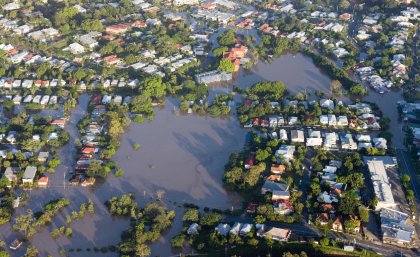
Research into the impact of the 2011 Queensland floods on pregnant women and their babies has found stress from natural disasters affects infant development and temperament.
Mater Research Institute—University of Queensland (MRI-UQ) researchers have found pregnant women who had the most significant emotional response to the disaster had infants with the most difficult temperaments.
The study was led by Professor of Midwifery Sue Kildea, who holds a joint appointment with Mater Research and UQ’s School of Nursing, Midwifery and Social Work.
The 2011 Queensland Floods study team found varying effects from fetal stress on infant development at six months of age.
“Higher levels of hardship in pregnancy resulted in boys receiving more irritable temperament ratings than girls,” Professor Kildea said.
“Difficult temperament traits early in life are related to later mental health and childhood behaviour problems.
“Improving support to women stressed during pregnancy could benefit their unborn child, as the womb environment is one of the earliest influences on infant temperament.”
Researcher Dr Gabrielle Simcock said high levels of maternal stress affected girls’ problem-solving abilities more than boys, and girls also demonstrated poorer cognitive and motor development skills.
“Prenatal stress was further linked to lower scores in two-year-olds’ abilities to understand and predict another person’s emotions and behaviours – which could cause later problems with their ability to engage socially with others,” Dr Simcock said.
“These results demonstrate how stress in pregnancy can negatively shape child development, and provide foundations for developing interventions aimed at pregnant women affected by a natural disaster.”
Dr Vanessa Cobham said it was important to identify risk factors of poor mental health early.
“We can then target those women for interventions to reduce their stress in pregnancy to optimise their infants’ long-term development,” she said.
The studies also found that higher emotional reaction to the flood was related to better fine motor development at two months of age and improved problem-solving among boys at six months of age.
Research from the 2011 Queensland Flood study has been published in the Journal of Behavioral and Developmental Pediatrics, Developmental Psychobiology, the Journal of the Developmental Origins of Health and Disease, and Developmental Psychology.
Media: Mater Public Affairs Manager, Jackie Hayes, jacqueline.hayes@mater.org.au, 07 3163 2378 or 0422 115 874; UQ Communications, Kirsten O’Leary, kirsten.oleary@uq.edu.au, 07 3365 7436.
.jpg)









